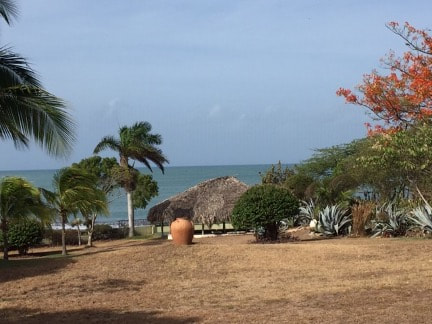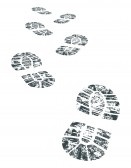| Waving good-bye to our husbands, my friend and I flew off to Jamaica where ingesting magic mushrooms (psilocybin)* is legal. (Note: It's been decriminalized in several states in the U.S. so there are opportunities to take trips, figuratively and literally, stateside.) Yes, it's a psychedelic, and no, neither of us had ever tried them before. Why would two women in their early 70s do such a thing? I can't speak for my friend, but as a born and bred neurotic, I sought to heal more. I'd already found relief taking medication prescribed by a psychiatrist since 1985. That medication (along with talk therapy in the beginning) took the edge off my formerly panic-ridden reclusive self. After 28 years of panic attacks, I haven't had one since 1985. But like the leftover mayonnaise in a jar, I needed something more radical to eliminate the viscous remains of anxiety and depression. | CAVEATS • Take them in a safe and supportive environment. |
Taking mushrooms is not any easier than picking up the phone and making that first therapy appointment. Both take a tremendous amount of courage. After all, either action means you are willing to open up the dark corners of your heart, brain and soul. If it isn't pain that compels you to take action, it may be the curiosity to know oneself better.
There is a lot of pain in the world, and I'm willing to bet a lot of people are suffering needlessly. I also suspect most everyone has experienced trauma, sometimes unconsciously during preverbal life or while in utero. Our culture, too, encourages us to repress our emotions, and that repression can have physical and/or mental consequences. These are all good reasons to seek therapy.
I spent a week at MycoMeditations, (https://www.mycomeditations.com/) an pricey retreat specifically designed to gently coach people through the highs and lows of their three trips, and to integrate what they learned from their trips into their everyday lives.
Facing a bay on the Atlantic Ocean where waves crashed onto the shore night and day, 13 participants and 7 facilitators gathered, along with cooking, cleaning and custodial staff. This wasn't meant to be a recreational joy trip like the hippies of yore: tripping out, tuning out and dropping out. No. This was to be a tripping in, tuning in and dropping into your inner self, and facing whatever arose. The facilitators were there to listen, soothe or help you breathe through any challenges you might face. They were also there to ensure your safety.
Before each session our group gathered under a large, thatched roof, the wind off the shore keeping us cool from the hot and humid Jamaican clime. We told each other why we'd come, what we hoped to gain. To a person, we all had read Michael Pollan's book, How to Change Your Mind: What the New Science of Psychedelics Teaches Us About Consciousness, Dying, Addiction, Depression, and Transcendence
Listening carefully and asking questions, the primary facilitator, Eric Osborne, helped each of us individually determine a dosage we'd be comfortable with. The mushrooms themselves are grown on a nearby property, then are dried and encapsulated. Each capsule contains one-half gram of mushrooms. I liked that the dosage was regulated. The regulation allowed me to take ever-increasing amounts—starting out slow and ending at a higher dose. The nifty thing about psilocybin is that it is not toxic. There are caveats though (see sidebar at top of page).
There is a lot of pain in the world, and I'm willing to bet a lot of people are suffering needlessly. I also suspect most everyone has experienced trauma, sometimes unconsciously during preverbal life or while in utero. Our culture, too, encourages us to repress our emotions, and that repression can have physical and/or mental consequences. These are all good reasons to seek therapy.
I spent a week at MycoMeditations, (https://www.mycomeditations.com/) an pricey retreat specifically designed to gently coach people through the highs and lows of their three trips, and to integrate what they learned from their trips into their everyday lives.
Facing a bay on the Atlantic Ocean where waves crashed onto the shore night and day, 13 participants and 7 facilitators gathered, along with cooking, cleaning and custodial staff. This wasn't meant to be a recreational joy trip like the hippies of yore: tripping out, tuning out and dropping out. No. This was to be a tripping in, tuning in and dropping into your inner self, and facing whatever arose. The facilitators were there to listen, soothe or help you breathe through any challenges you might face. They were also there to ensure your safety.
Before each session our group gathered under a large, thatched roof, the wind off the shore keeping us cool from the hot and humid Jamaican clime. We told each other why we'd come, what we hoped to gain. To a person, we all had read Michael Pollan's book, How to Change Your Mind: What the New Science of Psychedelics Teaches Us About Consciousness, Dying, Addiction, Depression, and Transcendence
Listening carefully and asking questions, the primary facilitator, Eric Osborne, helped each of us individually determine a dosage we'd be comfortable with. The mushrooms themselves are grown on a nearby property, then are dried and encapsulated. Each capsule contains one-half gram of mushrooms. I liked that the dosage was regulated. The regulation allowed me to take ever-increasing amounts—starting out slow and ending at a higher dose. The nifty thing about psilocybin is that it is not toxic. There are caveats though (see sidebar at top of page).

